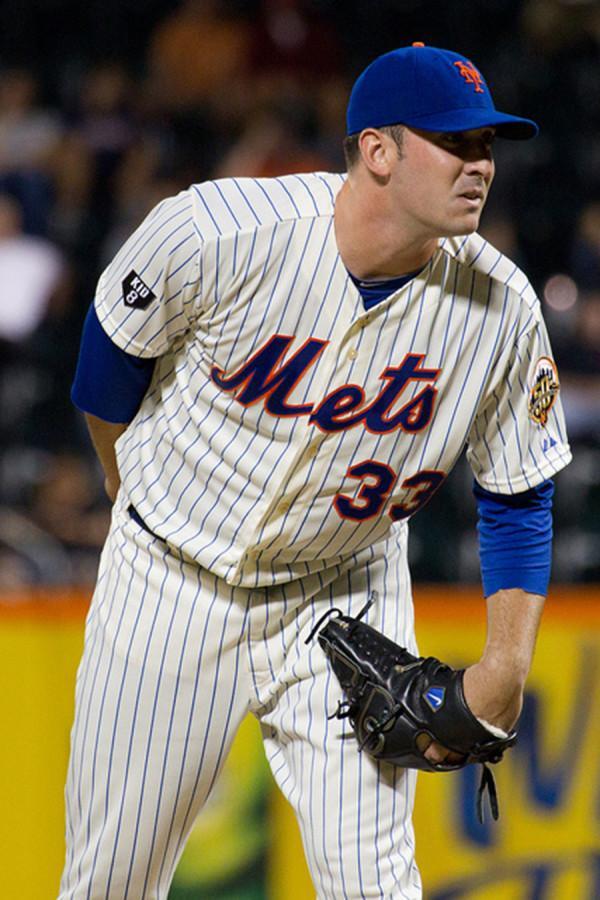The Matt Harvey Question
Matt Harvey is a professional baseball pitcher for the New York Mets.
September 9, 2015
By Bobby Wagner, Sports Editor
Let me start this with some background about my childhood. Before I could spell my own name, my grandfather was reading me outlandish headlines on the back of the New York Post about Mike Piazza. Before I realized the social taboo of wearing Mets attire in Phillies territory, I was donning a David Wright jersey and Mets button down Starter pants to school twice a week. I lived through the horrific collapses of 2007 and 2008 as a Mets fan, and I lived through them 20 minutes north of Philly. With all that being said, I have never been more proud or excited to be a Mets fan. Which is why, as any Mets fan can tell you, I have also never been more anxious to be a Mets fan.
Mets ace Matt Harvey, who is in his first year back in the majors after undergoing Tommy John surgery, has dominated recent baseball headlines. His agent, Scott Boras, came out and said that Harvey would be shut down for the season when he reached 180 innings pitched. Harvey explained in a Player’s Tribune article last week that he and the Mets have ultimately come to an agreement: that he’ll finish out the season skipping a few starts, hang around 180 in the regular season, and then they’ll cut him loose to break that cap in the playoffs.
This is both scary and exciting for an organization that is trying to escape its notoriety as one of the biggest laughing stocks in modern professional sports. But there is still, as always with big market names in sports, an argument to be had.
The two schools of thought are these: 1) end the pitcher’s season and rest them to keep them healthy or 2) let them pitch so long as they feel healthy, because that’s what they’re being paid millions of dollars to do. To sift through some of the points, we’re going to look at two other star pitchers who were at one point in Harvey’s position: the St. Louis Cardinals’ Adam Wainwright and Washington Nationals phenom Stephen Strasburg.
Adam Wainwright
Adam Wainwright, in my mind at least, is the prime case for the argument against shutting pitchers down early. Wainwright had the same Tommy John surgery in 2011, then pitched just a hair under 200 innings in the 2012 season. That season was about league-average in a career full of All-Star seasons, but since then he has been his usual phenomenal self, posting a sub-3.00 ERA in every campaign since. In 2013 he pitched a career-high 241 innings, posting a 2.94 ERA en route to being an integral cog in the Cardinals run to the the World Series, where they lost to the Red Sox. Logic would say that innings freedom did not harm Wainwright in the long term, and the numbers back that up. With the help of one of the best players the league has to offer, the Cardinals were able to flirt with the pinnacle of baseball. It cannot be understated how much a premium pitcher can carry a team in a playoff run. If you’re unfamiliar with this, Google search Madison Bumgarner. Which leads us to our other case in Strasburg, which is a bit harder to crack.
Stephen Strasburg
When Stephen Strasburg got the call up to The Show, he was billed as the savior of baseball. When the Nats announced he needed Tommy John to repair his pitching elbow, the better part of the baseball world mourned. He made about as strong a comeback as someone can from such a serious surgery, making the All-Star team in 2012 and cruising to a 3.16 ERA with almost 200 strikeouts. With the best record in baseball, the Nats decided the health of their budding superstar was more important than their present playoff run, so they terminated his season when he reached his hard innings cap of 160. The team went on to lose in the first round of the playoffs that season, and Washington hasn’t had as good of an opportunity at a World Series since then. Strasburg, on the other hand, has been good but inconsistent since the Nats deployed the innings limit strategy. He certainly hasn’t enjoyed the consistent dominance he was slated for, or that of Wainwright, but he’s still one of the game’s best pitchers, and his arm appears to be healthy for the long term.
With all that information on the table, the Mets decision doesn’t get any easier. There are plenty of other pitchers who have had different experiences, and everyone’s arm is unique. But as Mets legend Doc Gooden said on twitter recently, fans of the Amazin’s kind of always hoped Harvey would embody his give-me-the-damn-ball attitude and continue to pitch throughout the postseason if the Mets are fortunate enough to make it — and that’s still a monumental if. Speaking as a fan who wants to see the Mets win now, I’ve never been more confident in saying they’re making the right decision. But speaking as a fan who’s seen what the Mets have been through, I’m crossing my fingers and knocking on wood any chance I can get for Harvey’s health. Only time will tell if they’ve collectively made the right call.
Even though Harvey got shelled last night against the Nationals to the tune of seven earned runs, the Mets rotation looks to be as strong as it’s going to get going into the postseason. If Harvey can iron out his recent struggles, ignore the media frenzy and pitch like he’s capable of into October, he may give the Flushing faithful not only what they need, but what they deserve: hope.
Email Bobby Wagner at [email protected].











































































































































